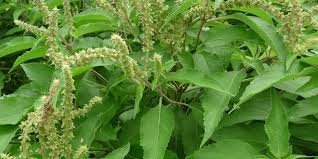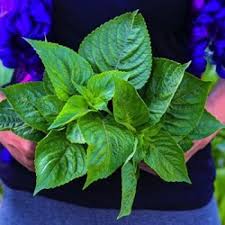Nunum leaves, commonly known as African basil or clove basil, are a highly aromatic herb widely used in various parts of Africa for their medicinal, culinary, and cultural significance.
This versatile plant, known for its distinctive fragrance and flavor, offers numerous benefits that make it valuable in traditional medicine, cooking, and even spiritual practices.
One of the primary benefits of nunum leaves lies in their rich medicinal properties. They are packed with essential nutrients such as vitamins A and C, calcium, iron, and antioxidants, which contribute to overall health and wellness.
These leaves are particularly known for their ability to boost the immune system. The presence of essential oils, such as eugenol and camphor, helps fight infections and protect the body against harmful pathogens. Additionally, nunum leaves have anti-inflammatory properties, which make them useful in relieving ailments such as coughs, colds, and respiratory issues.
Nunum leaves are also beneficial for digestive health. In traditional medicine, they are often used to treat stomach problems such as indigestion, bloating, and diarrhea. The leaves help improve digestion by stimulating the production of digestive enzymes and soothing the stomach lining. This makes them a natural remedy for people suffering from gastrointestinal discomfort.
Another significant advantage of nunum leaves is their ability to reduce stress and anxiety. The leaves are known for their calming effects, and when used in teas or as an essential oil, they help to relax the mind and body. In some cultures, nunum leaves are used in spiritual practices to cleanse the atmosphere, promote relaxation, and ward off negative energy.
In addition to their medicinal uses, nunum leaves have culinary applications. They are used to flavor a variety of dishes, adding a unique taste and aroma to soups, stews, and sauces.
The leaves are also used in teas, which are enjoyed not only for their taste but also for their health benefits. In many African households, nunum leaves are a staple ingredient in cooking due to their versatility and nutritional value.
The antioxidant properties of nunum leaves contribute to their role in skin and hair care. They are often used to treat skin conditions such as acne, rashes, and wounds due to their antibacterial and antifungal properties.
When applied topically, nunum leaves can help promote the healing of minor cuts and infections, while also improving the appearance of the skin. Additionally, they are used in hair care products to strengthen hair and promote healthy growth.
Nutritional Value of Nunum Leaves

Nunum leaves, also known as African basil or clove basil, are highly nutritious and offer a variety of health benefits. These leaves contain a wide range of essential nutrients, including:
1. Vitamins: Nunum leaves are rich in vitamins A, C, and K. Vitamin A is crucial for eye health, vitamin C supports the immune system, and vitamin K helps with blood clotting and bone health.
2. Minerals: Nunum leaves are a good source of important minerals like calcium, iron, magnesium, and potassium. These minerals support bone health, oxygen transport, muscle function, and overall cellular health.
3. Dietary Fiber: The leaves contain dietary fiber, which aids in digestion and helps to maintain bowel health.
4. Essential Oils: Nunum leaves have a high content of essential oils like eugenol, which provide anti-inflammatory and antimicrobial properties.
Nunum Leaves as a Rich Source of Antioxidants
Nunum leaves are packed with powerful antioxidants, which help protect the body from oxidative stress and free radical damage. The key antioxidants found in Nunum leaves include:
1. Eugenol: This compound, present in large amounts in Nunum leaves, is a potent antioxidant that helps neutralize harmful free radicals in the body.
2. Vitamin C: Acting as an antioxidant, vitamin C helps reduce inflammation and supports skin health by protecting cells from oxidative stress.
3. Flavonoids: These natural compounds have strong antioxidant properties that help reduce the risk of chronic diseases by protecting cells from damage caused by oxidative stress.
Read Also: 16 Medicinal Health Benefits of Asarum europaeum (European wild ginger)
Health Benefits of Nunum Leaves for Digestion

1. Relieving Indigestion: The essential oils and fiber in Nunum leaves help improve digestion and relieve symptoms of indigestion, such as bloating, gas, and discomfort.
2. Reducing Stomach Inflammation: Eugenol, a key component of Nunum leaves, has anti-inflammatory properties that soothe the digestive tract, reducing stomach irritation and inflammation.
3. Promoting Healthy Bowel Movements: The fiber in Nunum leaves supports regular bowel movements and prevents constipation by promoting healthy digestion.
Nunum Leaves and Immune System Support
Nunum leaves provide strong immune system support, primarily due to their high content of vitamins, antioxidants, and essential oils. Here’s how they boost immunity:
1. Vitamin C: Nunum leaves are rich in vitamin C, a vital nutrient for strengthening the immune system by enhancing the function of white blood cells, which help fight off infections.
2. Antimicrobial Properties: The essential oils, particularly eugenol, found in Nunum leaves have antimicrobial and antibacterial properties, helping the body fight against bacterial and viral infections.
3. Anti-Inflammatory Effects: The anti-inflammatory compounds in Nunum leaves reduce chronic inflammation, which can weaken the immune system, thereby promoting a healthier immune response.
The Role of Nunum Leaves in Respiratory Health
Nunum leaves, also known as African basil or scent leaf, play an important role in supporting respiratory health due to their medicinal properties. They are commonly used in traditional medicine to alleviate respiratory issues such as coughs, colds, asthma, and bronchitis. Some of the key ways nunum leaves benefit respiratory health include:
1. Decongestant Effect: Nunum leaves are rich in essential oils, such as camphor and eucalyptol, which act as natural decongestants. These compounds help to clear nasal and chest congestion, making it easier to breathe.
2. Antibacterial and Antiviral Properties: The antimicrobial activity of nunum leaves helps fight against infections in the respiratory tract caused by bacteria and viruses. This makes them useful in treating common respiratory infections like colds and sore throats.
3. Relief for Asthma: Nunum leaves contain compounds that may help to relax the muscles of the airways, reducing the severity of asthma symptoms. Drinking nunum leaf tea or inhaling steam infused with the leaves can help open up the airways and ease breathing.
4. Sore Throat Relief: Due to their soothing properties, nunum leaves can help reduce throat irritation and inflammation caused by coughing or infection. They are often boiled into a tea and consumed to soothe a sore throat.
Anti-inflammatory Properties of Nunum Leaves
Nunum leaves have potent anti-inflammatory effects, which make them beneficial for treating a range of inflammatory conditions. These properties are largely attributed to the presence of bioactive compounds such as flavonoids, tannins, and polyphenols. Here are the key anti-inflammatory benefits:
1. Reducing Swelling: Nunum leaves help to reduce swelling and pain associated with inflammation, making them useful for treating conditions like arthritis, joint pain, and muscle inflammation.
2. Combating Inflammatory Diseases: Regular consumption of nunum leaves may help manage chronic inflammatory diseases such as asthma, cardiovascular disease, and inflammatory bowel conditions by reducing inflammation in the body.
3. Skin Inflammation: Applying nunum leaf extract or oil topically can help reduce skin inflammation caused by rashes, insect bites, or infections. The leaves soothe irritated skin and promote faster healing.
4. Alleviating Respiratory Inflammation: When used as a remedy for respiratory conditions, nunum leaves can reduce inflammation in the airways, easing symptoms such as coughing and wheezing.
Benefits of Nunum Leaves for Skin Health
Nunum leaves are widely known for their positive effects on skin health, thanks to their antimicrobial, anti-inflammatory, and antioxidant properties. Here’s how they benefit the skin:
1. Fighting Skin Infections: Nunum leaves contain antibacterial and antifungal properties that help fight infections on the skin, such as acne, fungal infections, and boils. Applying nunum leaf extract directly to the affected area can promote healing.
2. Anti-aging Benefits: The antioxidants in nunum leaves protect the skin from damage caused by free radicals, which can lead to premature aging. Using nunum leaves regularly may help reduce the appearance of fine lines and wrinkles, keeping the skin looking youthful.
3. Skin Soothing: For irritated or inflamed skin, nunum leaves can provide a soothing effect. Whether applied topically or used as a part of skincare routines, they help reduce redness, itching, and discomfort caused by conditions like eczema or psoriasis.
4. Moisturizing and Nourishing: Nunum leaves are often used in skincare products to help hydrate and nourish the skin. The essential oils present in the leaves lock in moisture and prevent the skin from becoming dry or cracked.
Read Also: 17 Medicinal Health Benefits of Cedrus Deodara (Deodar Cedar)
Nunum Leaves and Blood Sugar Regulation

Nunum leaves, or scent leaves, have been traditionally used to help regulate blood sugar levels, making them a potential natural remedy for managing diabetes and preventing blood sugar spikes. The key ways nunum leaves support blood sugar regulation include:
1. Insulin Sensitivity Improvement: Studies suggest that compounds in nunum leaves may enhance insulin sensitivity, enabling the body to use insulin more effectively and thus lowering blood sugar levels.
2. Reducing Blood Glucose Levels: Nunum leaves are known to have a hypoglycemic effect, meaning they can help reduce the amount of glucose in the blood. This is beneficial for people with diabetes or those at risk of developing the condition.
3. Slowing Down Carbohydrate Absorption: Consuming nunum leaves may help slow down the digestion and absorption of carbohydrates, preventing rapid increases in blood sugar after meals.
4. Antioxidant Activity: The antioxidants found in nunum leaves also help reduce oxidative stress, which plays a role in the development of insulin resistance and high blood sugar levels.
The Use of Nunum Leaves in Traditional Medicine
Nunum leaves have a long history of use in traditional medicine, particularly in African and Asian cultures, where they are valued for their medicinal properties. Some of their common uses in traditional healing include:
1. Treatment of Malaria: In some cultures, nunum leaves are used as part of herbal remedies to treat malaria. The leaves are often boiled into a tea or made into a concoction believed to help combat the illness.
2. Relief for Gastrointestinal Issues: Nunum leaves are frequently used to treat digestive problems such as diarrhea, stomach pain, indigestion, and flatulence. Their soothing properties help calm the digestive tract and reduce discomfort.
3. Fever and Flu Remedies: The leaves are traditionally boiled to make herbal teas or infusions that help reduce fever, treat colds, and provide relief from flu symptoms. The antimicrobial properties help fight infections, while the anti-inflammatory compounds reduce symptoms.
4. Wound Healing and Skin Care: Nunum leaves are applied to cuts, boils, and wounds to promote healing. Their antibacterial and anti-inflammatory properties help prevent infections and reduce inflammation, speeding up the recovery process.
5. Oral Health: Nunum leaves are chewed or used to make a mouthwash to improve oral health, helping to eliminate bad breath and treat oral infections such as toothaches and gum disease due to their antibacterial properties.
Culinary Uses and Benefits of Nunum Leaves
In addition to their medicinal uses, nunum leaves are a popular ingredient in cooking, especially in African cuisine. Their strong, aromatic flavor enhances the taste of various dishes while offering nutritional benefits.
1. Flavoring Soups and Stews: Nunum leaves are commonly used to season soups, stews, and sauces. Their unique aroma adds depth to dishes like pepper soup, vegetable soup, and other traditional meals.
2. Enhancing Meat and Fish Dishes: The leaves are often used to flavor meat and fish, bringing out a rich and spicy taste. In some recipes, they are mixed with other herbs to marinate fish or meat before cooking.
3. Tea Preparation: Nunum leaves can be boiled to make herbal tea, which is consumed for both its flavor and health benefits. The tea is believed to help with digestion, cold relief, and overall wellness.
4. Salads and Garnishes: Fresh nunum leaves are sometimes added to salads, stir-fries, and as garnishes to give a fresh, herby taste to the dish.
Do you have any questions, suggestions, or contributions? If so, please feel free to use the comment box below to share your thoughts. We also encourage you to kindly share this information with others who might benefit from it. Since we can’t reach everyone at once, we truly appreciate your help in spreading the word. Thank you so much for your support and for sharing!
Read Also: Definition of Environmental Safety: A Comprehensive Guide

